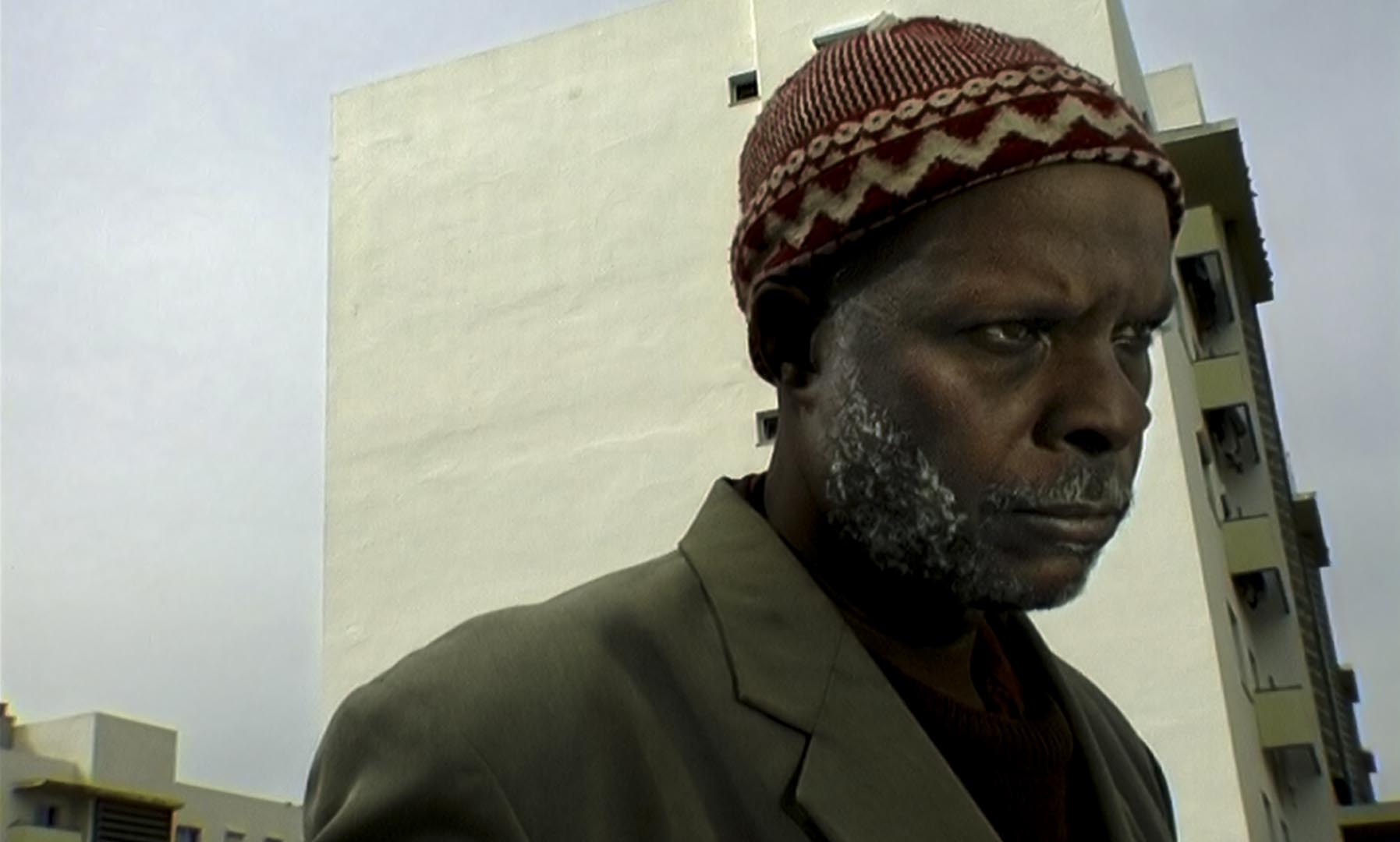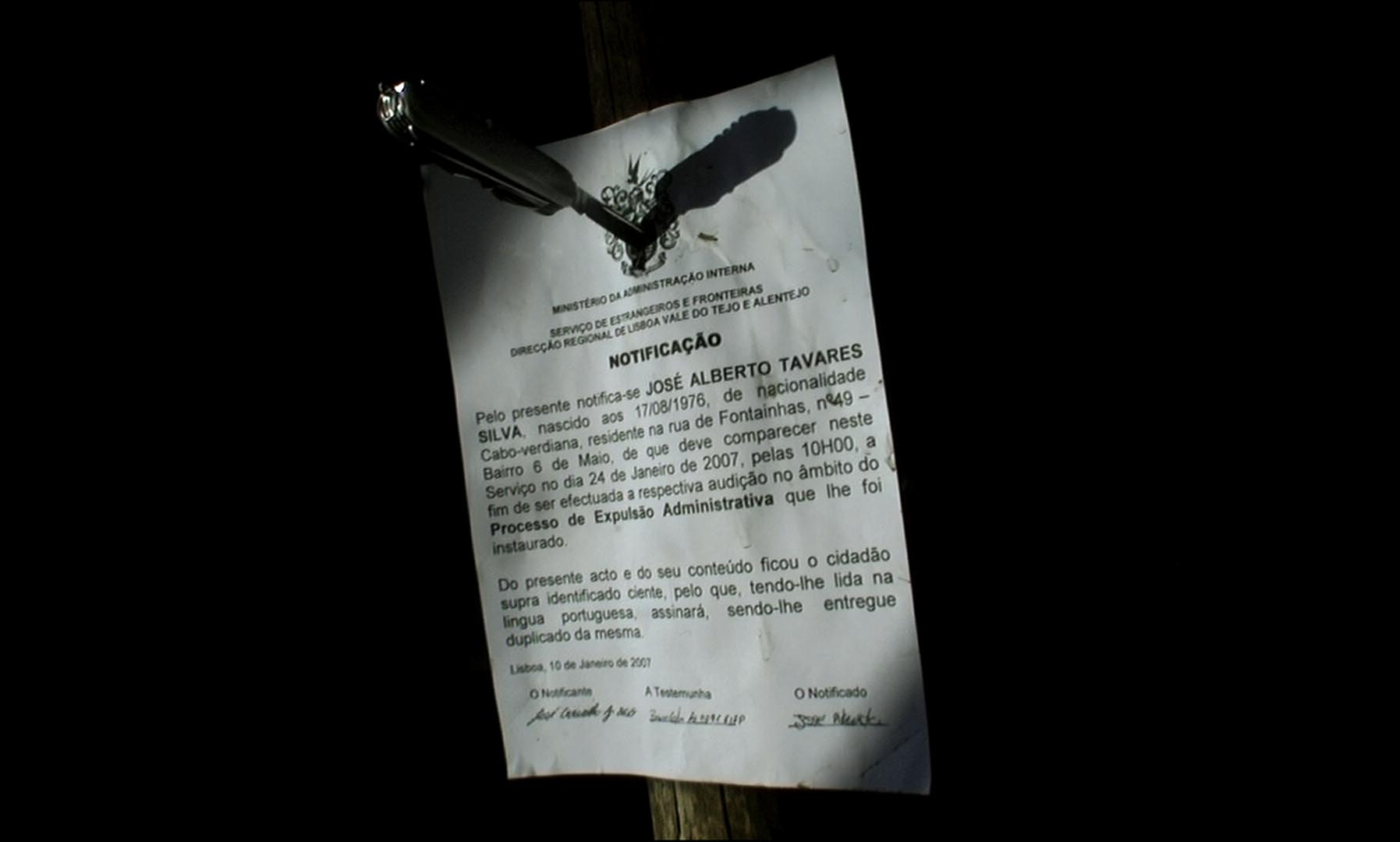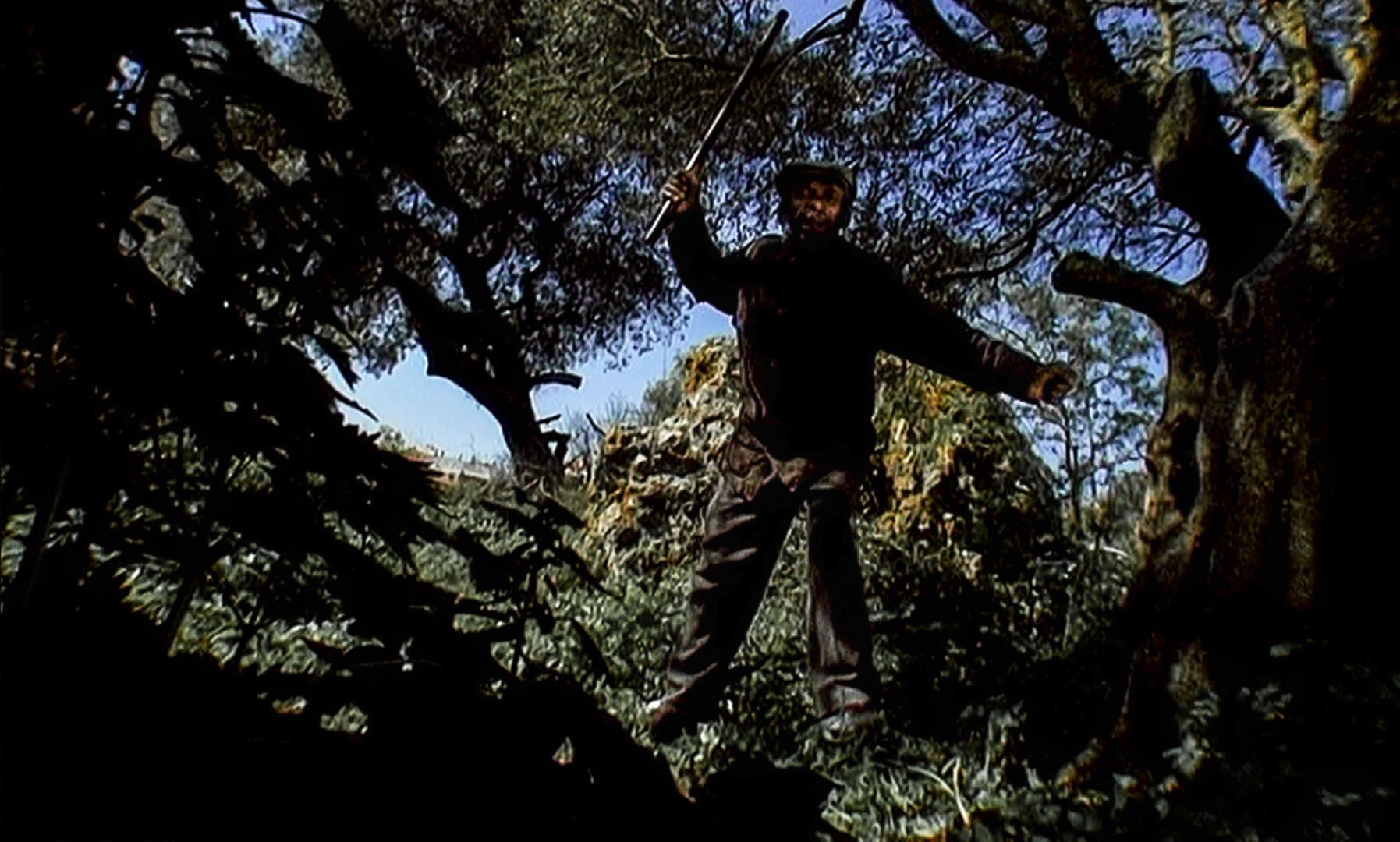18
OUR MAN 2010. PT. 24 min




a film by Pedro Costa.
«I was a good bricklayer. I've never made a crooked wall.
My boss never complained about me.
One day the work ended, I was left with no unemployment fund.
No pension, no family benefit.
I looked for work everywhere and couldn't find it.
I didn’t take any money home and Suzete ran with me.»
«I was a good bricklayer. I've never made a crooked wall.
My boss never complained about me.
One day the work ended, I was left with no unemployment fund.
No pension, no family benefit.
I looked for work everywhere and couldn't find it.
I didn’t take any money home and Suzete ran with me.»
by José Oliveira
Our Man closes another very special phase in Pedro Costa's work, composed of several short films re-editing senses, after the durations, amplitudes and wide breaths of In Vanda's Room (2002), Colossal Youth (2006) and Horse Money (2014), immense fresco shattered by increasingly distant memories of its protagonists, calibrated in a dry and hard rhythm that has a lot to do, for example, with a film by Charles Chaplin that the director recently chose to pair up with the short, Monsieur Verdoux. Pedro Costa started directing in 1989 with O Sangue, a story about brothers abandoned to the world, where the eternal questions of the Father, love and self-discovery are born again in a searing black and white which accentuates the horrors and the fantastic side of this initiatory demand between compulsive sleeps and deep vigils, "the long childhood night that embraces so many films and so many American books", in his own words.
After paying the sentimental debts of his youth, he left to Cape Verde for a few years with the aim of forging a kind of a remake of I Walked with a Zombie, Tourneur's demented nightmare, set in poisonous tropics, reminiscent of Charlotte Brontë, Jane Eyre, atmospheres, heat and ice bent in a gothic and in a nameless and surnameless stream. On this island of fire that breaks out that breaks out at a suffocating time, disproportionate and closed in on itself, the script and the typical planning of a film no longer make sense, as well as the numerous technical crews, and what was shot were close-ups of women and deambulations, whispers and a landscape impossible to tame. I.e., Pedro Costa lost himself to find himself again for everything he does after starts in Casa de Lava.
Returning to Portugal, the director found himself with a number of letters and natural products of this land in his hands, entrusted to him to be handed over to family members in Lisbon. He found a human universe and a raw and rich aesthetic he never wanted to abandon. Smells, intoxicating colors and sensations, the kind that cinema tends to run away from.
Ossos (1997) marks his installation in a territory, Fontainhas and its surrounding neighbourhoods, inhabited by the Cape Verde community. If Costa began by playing defense, using for example the great director of photography Emmanuel Machuel, as well as a big lighting apparatus, he soon realized the shock and immoral contradiction between what is filmed and how it is filmed. Ossos was a learning process taken over by darkness and a detachment that excavated the revolution that followed. With In Vanda's Room, he decisively abandoned big crews and the means of the so-called industrial cinema, so he could really reach people with the most recent and light digital devices - allowing him to be with people all the time necessary. From this time, this unconditional availability to listen to the unique life stories and daily life of the neighbourhood, any type of genre or cinematographic border was abolished, registering people instead of characters, their movement and consequently the movement of their world, never leaving aside a very strong Romanesco that sprang from memory and the hearts of each one of those beings that live and inhabit the world intensely.
In Colossal Youth, Ventura appears, a capital and representative figure of an entire people and their condition, of a past and a inherent haughtiness, as immense as before Vanda had been intimate and resistant, building the whole into a grandeur that spread besides the rooms and the neighbourhood in destruction, in an epic battle between the blackness of the ruins and the blinding white of a new world, in unpredictable shocks across the screen. In the film's last shot, the cosmic and the old and wise Ventura co-exist in a balance, in a suspension that the following short films would clarify through the interstices of the deepest secrets.
Our Man shares several shots and sequences of Tarrafal (2007) and Caça ao Coelho com Pau (2007), its predecessors. The film opens with a establishing shot that occupies a good part of its twenty-five minutes, motionless, hard and in the dark as what it is being said, where a Mother and a child, bringing together the promises of a childhood and adult disillusionment, they glimpse a past in their homeland, they create a family and affective cartography, a political state of things and a fierce denunciation that its extreme rawness and reality reveals magical touches.
"There is no light that can illuminate such darkness", says the Mother ambiguously, because such darkness is already there and here, where they fled from and where they are fleeing to. Composition and background sending us directly to Casa de Lava.
From then on we walk with Venture and Alfredo through alleys and common lands, stairwells and emergency exits, where the second tells the first one his downfall, still amazed and not realizing what has happened to him. From clandestine soup to rabbits hunted with sticks, the old man's narrative becomes the narrative promised to José Alberto Tavares Silva, the son of the opening shot, just like the story told about the meal not paid for and the tragic consequences of it are part of Alfredo and Ventura, both already killed too many times by entities as abstract as brutally brutally corporeal. Entities that, just like the rabbit, we will never see, and are displaying dimensions of evil in an absolute and phantasmagorical, immemorial and contemporary way, cold machine and faceless enemy responsible for all persecution, misery and genocide to a race that, like so many others, run the risk of being left without a homeland, future or dignity. An evil that appears whole in common remembrance.
For the dagger and the final expulsion to make even more sense now, after Horse Money ends with knives, songs and promises of justice, pacified and serious, now warning Ventura and all of his in the same way as they were warned and attacked before. Our Man speaks of many who are one and only speaks of current things, that is, unemployment, money, fear or unruled people, but instead of preferring denunciation for the sake of denunciation, he prefers to work that in formal correspondence, appealing to all the light of beauty and to all the guarded humanism, far from puerile audiovisual or demagogic paragons houses built by masked power. The power of cinematographic forms and the irreducible force of love, beyond the chaos that instills us in power. Power, strength and love, which we can still find in Pedro Costa's journey in Where Does Your Hidden Smile Lie? (2001), in a sharing process and reinforcing convictions with Danièle Huillet and Jean-Marie Straub; or Ne change rien (2009), a letter of friendship and protection to Jeanne Balibar. Something that a great part of past cinema history that prevailed and continues to echo and comment on our present, from the American classics to the Russians, made us see and feel in an amplified way; namely, the tutelary reference of John Ford, the American cinema bible that also influenced Sergei M. Eisenstein, in a belief and unity without limits. The monumentality of the scales and their fairness, the chiseling space of general modeling (words, gestures, silences) placing men and women in rotation with the environment and infinity. From generosity and commitment, in a whole.
Our Man closes another very special phase in Pedro Costa's work, composed of several short films re-editing senses, after the durations, amplitudes and wide breaths of In Vanda's Room (2002), Colossal Youth (2006) and Horse Money (2014), immense fresco shattered by increasingly distant memories of its protagonists, calibrated in a dry and hard rhythm that has a lot to do, for example, with a film by Charles Chaplin that the director recently chose to pair up with the short, Monsieur Verdoux. Pedro Costa started directing in 1989 with O Sangue, a story about brothers abandoned to the world, where the eternal questions of the Father, love and self-discovery are born again in a searing black and white which accentuates the horrors and the fantastic side of this initiatory demand between compulsive sleeps and deep vigils, "the long childhood night that embraces so many films and so many American books", in his own words.
After paying the sentimental debts of his youth, he left to Cape Verde for a few years with the aim of forging a kind of a remake of I Walked with a Zombie, Tourneur's demented nightmare, set in poisonous tropics, reminiscent of Charlotte Brontë, Jane Eyre, atmospheres, heat and ice bent in a gothic and in a nameless and surnameless stream. On this island of fire that breaks out that breaks out at a suffocating time, disproportionate and closed in on itself, the script and the typical planning of a film no longer make sense, as well as the numerous technical crews, and what was shot were close-ups of women and deambulations, whispers and a landscape impossible to tame. I.e., Pedro Costa lost himself to find himself again for everything he does after starts in Casa de Lava.
Returning to Portugal, the director found himself with a number of letters and natural products of this land in his hands, entrusted to him to be handed over to family members in Lisbon. He found a human universe and a raw and rich aesthetic he never wanted to abandon. Smells, intoxicating colors and sensations, the kind that cinema tends to run away from.
Ossos (1997) marks his installation in a territory, Fontainhas and its surrounding neighbourhoods, inhabited by the Cape Verde community. If Costa began by playing defense, using for example the great director of photography Emmanuel Machuel, as well as a big lighting apparatus, he soon realized the shock and immoral contradiction between what is filmed and how it is filmed. Ossos was a learning process taken over by darkness and a detachment that excavated the revolution that followed. With In Vanda's Room, he decisively abandoned big crews and the means of the so-called industrial cinema, so he could really reach people with the most recent and light digital devices - allowing him to be with people all the time necessary. From this time, this unconditional availability to listen to the unique life stories and daily life of the neighbourhood, any type of genre or cinematographic border was abolished, registering people instead of characters, their movement and consequently the movement of their world, never leaving aside a very strong Romanesco that sprang from memory and the hearts of each one of those beings that live and inhabit the world intensely.
In Colossal Youth, Ventura appears, a capital and representative figure of an entire people and their condition, of a past and a inherent haughtiness, as immense as before Vanda had been intimate and resistant, building the whole into a grandeur that spread besides the rooms and the neighbourhood in destruction, in an epic battle between the blackness of the ruins and the blinding white of a new world, in unpredictable shocks across the screen. In the film's last shot, the cosmic and the old and wise Ventura co-exist in a balance, in a suspension that the following short films would clarify through the interstices of the deepest secrets.
Our Man shares several shots and sequences of Tarrafal (2007) and Caça ao Coelho com Pau (2007), its predecessors. The film opens with a establishing shot that occupies a good part of its twenty-five minutes, motionless, hard and in the dark as what it is being said, where a Mother and a child, bringing together the promises of a childhood and adult disillusionment, they glimpse a past in their homeland, they create a family and affective cartography, a political state of things and a fierce denunciation that its extreme rawness and reality reveals magical touches.
"There is no light that can illuminate such darkness", says the Mother ambiguously, because such darkness is already there and here, where they fled from and where they are fleeing to. Composition and background sending us directly to Casa de Lava.
From then on we walk with Venture and Alfredo through alleys and common lands, stairwells and emergency exits, where the second tells the first one his downfall, still amazed and not realizing what has happened to him. From clandestine soup to rabbits hunted with sticks, the old man's narrative becomes the narrative promised to José Alberto Tavares Silva, the son of the opening shot, just like the story told about the meal not paid for and the tragic consequences of it are part of Alfredo and Ventura, both already killed too many times by entities as abstract as brutally brutally corporeal. Entities that, just like the rabbit, we will never see, and are displaying dimensions of evil in an absolute and phantasmagorical, immemorial and contemporary way, cold machine and faceless enemy responsible for all persecution, misery and genocide to a race that, like so many others, run the risk of being left without a homeland, future or dignity. An evil that appears whole in common remembrance.
For the dagger and the final expulsion to make even more sense now, after Horse Money ends with knives, songs and promises of justice, pacified and serious, now warning Ventura and all of his in the same way as they were warned and attacked before. Our Man speaks of many who are one and only speaks of current things, that is, unemployment, money, fear or unruled people, but instead of preferring denunciation for the sake of denunciation, he prefers to work that in formal correspondence, appealing to all the light of beauty and to all the guarded humanism, far from puerile audiovisual or demagogic paragons houses built by masked power. The power of cinematographic forms and the irreducible force of love, beyond the chaos that instills us in power. Power, strength and love, which we can still find in Pedro Costa's journey in Where Does Your Hidden Smile Lie? (2001), in a sharing process and reinforcing convictions with Danièle Huillet and Jean-Marie Straub; or Ne change rien (2009), a letter of friendship and protection to Jeanne Balibar. Something that a great part of past cinema history that prevailed and continues to echo and comment on our present, from the American classics to the Russians, made us see and feel in an amplified way; namely, the tutelary reference of John Ford, the American cinema bible that also influenced Sergei M. Eisenstein, in a belief and unity without limits. The monumentality of the scales and their fairness, the chiseling space of general modeling (words, gestures, silences) placing men and women in rotation with the environment and infinity. From generosity and commitment, in a whole.
directed by PEDRO COSTA script JOSÉ ALBERTO SILVA, LUCINDA TAVARES, ALFREDO MENDES, VENTURA, ANTÓNIO SEMEDO, PEDRO
COSTA with JOSÉ ALBERTO SILVA, LUCINDA TAVARES, ALFREDO
MENDES, VENTURA, ANTÓNIO SEMEDO image PEDRO COSTA editing PATRÍCIA SARAMAGO, JOÃO DIAS sound OLIVIER BLANC music N 'TONI DENTI D'ORO production OPTEC, SOCIEDADE OPTICA TÉCNICA producer ABEL RIBEIRO CHAVES